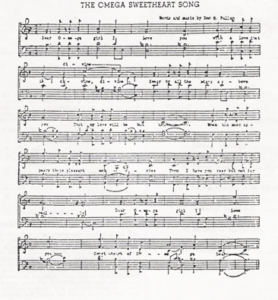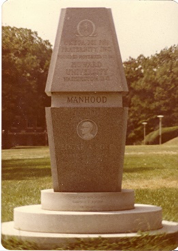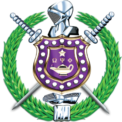
The Birth of Omega Psi Phi Fraternity
On Friday evening, November 17, 1911, three Howard University undergraduate liberal arts students – 23 year-old Oscar James Cooper (the laboratory assistant in Biology who was the link between Omega’s Founders and Professor Just), 21 year-old Frank Coleman and 20 year old Edgar Amos Love met with their faculty adviser, the 28 year old Professor Ernest Everett Just, in his office in Science Hall to establish a Fraternity.
At this meeting, they decided that the Fraternity’s motto would be “Friendship is essential to the soul” as symbolized by three Greek letters ΩΨΦ – Omega Psi Phi – which are the initials of the three Greek words – Ophelema Philia Psurkis – representing the motto: Friendship is Essential to the Soul. They chose Manhood, Scholarship, Perseverance and Uplift as the four Cardinal Principles of the Fraternity and decided upon the design of the Fraternity’s pin and escutcheon.
On Thursday, November 23, 1911, the three undergraduate Founders met and elected Edgar A. Love as Grand Basileus, Oscar J. Cooper as Grand Keeper of Records and Frank Coleman as Grand Keeper of Seals.
Oscar J. Cooper became the Fraternity’s second Grand Basileus in 1912. During Cooper’s administration, a request was received for the establishment of a Chapter at the University of Michigan. This was tabled on April 26, 1913. He then authorized the investigation of a proposed second chapter at Lincoln University, in Oxford, PA.
Edgar A. Love was elected as the third Grand Basileus in 1913 at the 3rd Grand Conclave in Washington, D.C. and was re-elected to the post again at the 4th Grand Conclave in 1914. Under Love’s administration, Howard University withdrew its opposition to the Fraternity being a national organization. During the same year, Oscar J. Cooper, William Griffith Brannon, and John H. McMorries were dispatched to Lincoln University to establish the Fraternity’s second Chapter, Beta, which was chartered on February 6, 1914 at Lincoln University. Additionally, under his administration, Omega Psi Phi Fraternity was incorporated under the laws of the District of Columbia on October 28, 1914 at 1:11 PM.
George E. Hall, the fourth Grand Basileus, authorized the establishment of Gamma Chapter in Boston on December 13,1916 and appointed a committee of Brothers living in the Boston area to form the Chapter.
James C. McMorries, the brother of John H. McMorries, was elected the fifth Grand Basileus at the 5th Grand Conclave in 1916. In April 1917, the U.S. entered WWI and Omega men played a pivotal role in petitioning the Secretary of War for the establishment of an Officers Training Camp for African American men. The 17th Provisional Training Camp was established at Ft. Des Moines from June to October 1917. Sixteen Brothers participated in the Camp including Founders Edgar A. Love and Frank Coleman. Recognizing an opportunity for brotherhood and growth, these Brothers petitioned Grand Basileus McMorries for the establishment of a temporary Chapter at Ft. Des Moines. Permission was granted and Omega’s fourth Chapter, the War Chapter, was established with Jesse Heslip elected as Basileus. During its time, the Chapter initiated a total of ten men into the fold of Omega under two separate initiations. This helped lay the foundation for the future growth of the Fraternity.
At the 6th Grand Conclave, dental student Clarence F. Holmes was elected the sixth Grand Basileus in 1917. Under Holmes’ administration, the Fraternity’s first official hymn, “Omega Men Draw Nigh” written by Otto Bohannon, was established. Additionally, recognizing the success of the War Chapter, Holmes approved the establishment of a temporary Chapter, Camp Howard Chapter, during the Student Army Training Camp (SATC) at Howard University. This Camp was held to training college men as military instructors for their colleges and universities. Over 450 men from 70 colleges and universities attended the Camp from August 1 to September 16, 1918. During the brief time of the Camp Howard Chapter, 27 men from nine different colleges and universities were initiated into the Fraternity. Like the War Chapter, this laid the foundation of exponential growth for the Fraternity post-WWI.
Through the two temporary Chapters and the initiation of 37 men from different colleges, universities, and areas of the country, Raymond G. Robinson, the seventh Grand Basileus, spearheaded an unprecedented growth spur in the Fraternity during his administration. Elected Grand Basileus at the 7th Grand Conclave in 1918 and serving in that capacity until 1920, Robinson almost quadrupled the number of Chapter from 3 to 11 through leveraging these newly initiated Brothers. He also revived a dormant Gamma Chapter and established the first Chapters for alumni Brothers (the first graduate Chapter, Iota, was established on August 17, 1920 in Atlantic City, NJ, with the second, Lambda, established in November 1920 in Norfolk, VA, and the third, Mu, established in December 1920 in Philadelphia, PA). Another significant achievement under the Robinson administration was the publication of the first issue of The Oracle in June 1919 with Stanley M. Douglass, the Grand Keeper of Records, as the first Editor.
At the 9th Grand Conclave in Nashville, Harold H. Thomas was elected as the eighth Grand Basileus of the Fraternity. During his administration, the Campaign for the Study of Negro Literature and History was established. This was the Fraternity’s first national public initiative which was inspired by a stirring speech given by Dr. Carter G. Woodson, an honorary member of the Fraternity, at the 9th Grand Conclave in 1920 entitled “Democracy and the Man far Down.” Thomas continued the expansion of the Fraternity adding 7 more Chapters to the fold during 1921.
INTERNAL GROWTH
In 1922, Grand Basileus J. Alston Atkins appointed the first District Representatives. Today, there are eleven such officers who are elected annually by the district conferences/meetings.
Also in 1922, the office of Vice Grand Basileus was created and The Grand Keeper of Records became the Grand Keeper of the Records and Seal. In 1923, Lambda Chapter was organized at the University of Southern California (the original Lambda Chapter, which is a graduate Chapter in Norfolk, was renamed Lambda Omega). Omega Psi Phi becomes the first black Greek organization to span its membership across the United States – from the Atlantic (Iota in Atlantic City) to the Pacific (Lambda in Los Angeles). Sigma chapter was organized at McGill University, which is located in Montreal, Quebec (Canada) on December 15, 1923. Walter R. Dunston, former Basileus of Phi chapter, set up the Fraternity’s first international chapter with the assistance of George W. Brown. In 1926, the memorial for Colonel Charles Young was held at Arlington National Cemetery. The annual Memorial Service is established to memorialize Young’s birthday. The first Omega Bulletin was published in 1923 and Campbell C. Johnson, the Grand Keeper of Records and Seal, was the Editor of the Bulletin and The Oracle. In 1930, Omega Psi Phi became one of five founding members of the National Pan-Hellenic Council with 13th Grand Basileus Matthew W. Bullock elected as its first permanent chairman.
“Omega Dear,” was adopted as the official hymn in 1931. Charles R. Drew, professor of surgery, and Mercer Cook, professor of languages, both members of the Howard faculty, were the composers. Cook wrote the music and first stanza; Drew wrote the last two stanzas. By mid-1930, President Franklin D. Roosevelt created the Federal Council of Negro Affairs or “Black Cabinet,” which was an informal group of African-American public policy advisors who were organized to help the country emerge out of the depression. Omega men: Robert C. Weaver, Lawrence Oxley, Roscoe Brown, Frank Horne, William Hastie, J. Arthur Weiseger, Ted Poston, Campbell C. Johnson and William Trent were among those who served on the cabinet. Each of the Founders graduated and went on to have distinguished careers in their chosen fields: Edgar Love became a bishop in the Methodist church; Oscar Cooper practiced medicine in Philadelphia for over 50 years; Frank Coleman became the chairman of the Department of Physics at Howard University and Ernest E. Just became a world-renowned biologist and the 1st recipient of the prestigious NAACP Spingarn Medal.
 THE FORTIES
THE FORTIES
The Omega “Sweetheart Song”, with words and music by Don Q. Pullen, was adopted as the official sweetheart song by the 1940 Nashville Grand Conclave. Founder Ernest E. Just entered Omega Chapter in 1941. In 1941, Dr. Charles Drew perfected the use of blood plasma as a life-saving tool. William Hastie resigned as Civilian Aide to the Secretary of War in protest against discrimination in the Armed Forces. He was later appointed Governor of the Virgin Islands by President Truman. In 1949, the first National Headquarters Building at 107 Rhode Island Avenue, N.W., Washington, D.C. was purchased.
H. Carl Moultrie I, known as “Mr. Omega” was selected to serve as the first National Executive Secretary. In 1949, the scholarship fund was renamed the Charles R. Drew Memorial Scholarship Fund.
THE FIFTIES
During this era, the thrust was social change. Thousands of Omega men in every area of the country were actively involved in the fight to eliminate racial discrimination. An entire book could be written about this phase of Omega activities. The 1955 Los Angeles Grand Conclave initiated a program whereby each graduate chapter would purchase a Life Membership from the NAACP. Between 1955 and 1959, chapters contributed nearly $40,000 to the NAACP. In the fifties, Omega Psi Phi took an official position against hazing as a Fraternity activity. This anti-hazing position remains in effect today, and the policy banning hazing has been strengthened.
THE SIXTIES
The struggle for social justice shifted into high gear. Brothers were active participants in the “sit-ins” and other demonstrations designed to call attention to the plight of black Americans. Undergraduate brothers especially were involved in the demonstrative aspect of the civil rights struggle. In 1961, the Washington, D.C. Grand Conclave did an excellent job of highlighting Omega’s fifty years of accomplishments. Brothers attended the 1961 Golden Anniversary Conclave in record numbers. Founders Love, Cooper, and Coleman were present. Thirteen of twenty-three former Grand Basilei were in attendance. Young brothers had the once-in-a-life-time opportunity to mingle with some of the greatest black men that America had produced. The Golden Anniversary Conclave authorized $140,000-$150,000 for the construction of a new National Headquarters Building in Washington, D.C. In 1964, the new National Headquarters Building was dedicated. The building was a dream come true and was the first building of its type to be built by a black Fraternity. Founders Love, Cooper and Coleman participated in the ceremonies. The name was later changed to the International Headquarters. It was located at 2714 Georgia Avenue, N.W., Washington, D.C. 20001. Robert H. Lawrence (in 1966) was selected as the first Black to serve in the Astronaut Program. Lawrence had earned a Ph.D. Degree in chemistry at Ohio State University. Founder Frank Coleman entered Omega Chapter in 1967. The 1968 Charlotte Grand Conclave mandated a Constitutional Convention for the revision of the Constitution and By-Laws as well as the Ritual. The Convention was held in Atlanta in 1969.
 THE SEVENTIES
THE SEVENTIES
The newly revised Constitution and By-Laws and the Ritual became effective at the close of the 1970 Pittsburgh Grand Conclave. H. Carl Moultrie I, Omega’s only National Executive Secretary to this point, was appointed as a judge to the Superior Court of Washington, D.C., in 1972. Moultrie’s resignation was accepted with regrets. Omega conferred upon Moultrie the title of National Executive Secretary Emeritus which was later changed to Executive Secretary Emeritus. The Seventies brought more unpleasant news. Founder Oscar J. Cooper entered Omega Chapter in 1972. In 1974, Edgar A. Love, the only surviving founder, entered Omega Chapter. On November 16, 1975, an impressive granite monument was dedicated to the memory of the four founders. The monument is just a few feet away from Thirkield Hall, the site of Omega’s birthplace on the Howard University Campus. A revived Life Membership Program resulted in a large increase in the number of new Life Members. The 1976 Atlanta Grand Conclave was the largest in the history of the Fraternity up to that point in time. Many new undergraduate chapters were chartered, because of the increased enrollment of black students at previously all-white colleges and universities. “Operation Big Vote” was successful in getting thousands of black people to vote in the 1976 election. Many Omegas were active participants. The 1979 Denver Grand Conclave made a commitment to contribute a minimum of 250,000 dollars to the United Negro College Fund over the next five years.
THE EIGHTIES AND NINETIES
In 1981, the Omega Psi Phi Fraternity endowed its first Omega Faculty Chair. Rust College, Holly Springs, Mississippi, was the recipient. President W.A. McMillan stated that the Chair would be used to promote the humanities. The Fraternity completed its $250,000 contribution to the United Negro College Fund, an organization under the direction of Christopher F. Edley, and approved a plan to continue the annual gift of $50,000 to that organization in perpetuity. The Fraternity accelerated its financial support to the National Urban League. Mr. John Jacobs, Executive Director of the Urban League, participated in Grand Conclaves on a regular basis. Jesse Jackson, former president of Operation PUSH and founder of the Rainbow Coalition, attended Grand Conclaves on a regular basis and received support from these organizations as well as for his 1984 and 1988 campaigns for the Presidency of the United States.
The Seventy-fifth Anniversary Grand Conclave celebration was deemed the single most significant event on Omega’s horizon. The dates selected were July 25-August 1, 1986 in Washington, D.C., the city of Omega’s birth. It was the largest Conclave ever.
Grand Basileus Moses C. Norman, Sr., elected at the 1984 Louisville Grand Conclave, appointed a committee to review the structure and operations of the Fraternity as a means of future focus. In 1984, John S. Epps was selected as only the fifth Omega Man to wear the title of Executive Secretary. In 1990, the title was changed to Executive Director. Two revised methods of bringing members into the Fraternity were approved by the organization. Pledging was abolished and the new Membership Selection and Education Program came into being on August 1, 1985. In April 1991, the new Membership Intake Program was implemented
On January 13, 1990, Brother L. Douglas Wilder became Virginia’s sixty-sixth governor and became the first elected African American governor in United States history.
C. Tyrone Gilmore Sr. became the 34th Grand Basileus in June 1990. Under his leadership, a site for a new World Center and International Headquarters located in Decatur Ga. was identified. Also, the Fraternity’s structure was revamped and the international chapters were transformed into the 13th District. The first Youth Leadership Conference was held in 1993 at Southwest College located in Los Angeles, California. Over 100 young men were on hand to hear Omega men talk about subjects ranging from manners to morality.
Dorsey C. Miller Jr., the Fraternity’s 16th Second Vice Grand Basileus, was chosen as the 35th Grand Basileus at the Cleveland Grand Conclave in 1994. He was the 1st member to be elected to both positions. Miller’s administration closed the sale of the property at 3951 Snapfinger Parkway, which is the site of new international headquarters. The property at 2714 Georgia Ave. N.W. was disposed of. The Georgia Avenue location had served as the Fraternity’s headquarters for 31 years and the Fraternity shield that adorned the facade is now housed at the Smithsonian Institute.
Lloyd J. Jordan, Esq., who had previously served as Grand Counselor, was elected the 36th Grand Basileus at the 70th Grand Conclave in 1998 in New Orleans. In 1998, Brother David Satcher was appointed the 16th Surgeon General of the United States. Brother Togo West, Jr. was appointed Secretary of Veteran Affairs. Brother S. Earl Wilson was appointed executive director in June 2000.
The 2000’s
In 2002, George Grace was elected Grand Basileus during the 72nd Grand Conclave held in Charlotte, N.C. Under Grace’s leadership the Fraternity realized financial solvency and a steady increase in its membership rolls.
Warren G. Lee Jr., who served as the 23rd Second Grand Vice Basileus, became the 38th Grand Basileus during the Little Rock Grand Conclave in 2008. During Lee’s tenure, Omega fortified its mission and brought sustenance to those in need. Omega men from across the United States mentored the youth and organized various social action programs and donated millions to worthy causes.
In 2010, Dr. Andrew A. Ray was elected the 39th Grand Basileus during the 76th Grand Conclave held in Raleigh, North Carolina. During his administration, Omega became the first black Greek organization to charter an undergraduate chapter in Great Britain. The Fraternity also joined forces with President Barack Obama to promote Fatherhood and responsible parenting through the national Fatherhood Initiative. Omega celebrated its 100th anniversary with a grand celebration held in July 2011, in Washington D.C. Attendance exceeded 10,000. During that gathering, Brother Kenneth Barnes was named International Executive Director.
Antonio F. Knox Sr. was elected the Fraternity’s 40th Grand Basileus during the Grand Conclave in Philadelphia in 2014. Under Knox, the Fraternity championed a number of civil rights initiatives. Omega became a strong voice against police brutality, efforts to suppress voting rights and other social ills. The Fraternity sought plausible solutions to civil unrest that erupted in urban communities following fatal police shootings of several unarmed African-Americans. Today, Omega Psi Phi has over 700 chapters throughout the United States, Bermuda, Bahamas, Virgin Islands, Korea, Japan, Liberia, Germany, and Kuwait.
There are many notable Omega Men recognized as leaders in the arts, the sciences, academics, athletics, business, civil rights, education, government, and science sectors at the local, national and international level.
Omega has continued to flourish, largely because Founders Love, Cooper, Coleman and Just were men of the very highest ideals and intellect. The Founders selected and attracted men of similar ideals and characteristics. It is not by accident that many of America’s greatest black men are/were Omega Men. To this date, there are very few Americans whose lives have not been touched by a member of the Omega Psi Phi Fraternity.
Omega Psi Phi has a rich heritage that is to be protected, celebrated and enhanced! Since its humble beginnings on the Howard University campus, the Omega Psi Phi fraternity continues to be on the front line, leveraging its power, influence and more than 100 years of commitment to the uplift of our people and our communities.
For a more complete history of the Omega Psi Phi Fraternity, visit: https://oppf.org/about-omega/

